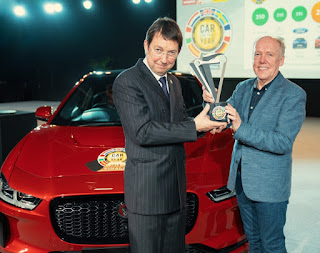Land Rover is working with the Mobile Malaria Project,
winners of the 2018 Land Rover Bursary in partnership with the Royal
Geographical Society (with IBG), as it heads to sub-Saharan Africa to embark on
a unique eight-week journey of Discovery.
Made up of three Oxford University researchers, led by Dr
George Busby, the Mobile Malaria Project will travel more than 6,300km across
Namibia, Zambia, Tanzania and Kenya. Driving a specially-modified Land Rover
Discovery, they will investigate the challenges facing those on the front line
of malaria control in Africa – where 90 per cent of the world’s cases occur.
Designed and developed by Land Rover Special Vehicle
Operations, the Discovery is equipped with a mobile genetic sequencing
laboratory that makes full-use of the vehicle’s 1,137-litre load space. Not
only does it feature a fridge/freezer unit to safely store scientific supplies,
there is also a bespoke load space configuration frame system with
specially-designed storage equipment cases and an on-board expedition battery.
The Land Rover Discovery has a 30-year track record of
tackling the most difficult terrain, reaching threatened habitats and
vulnerable people across the world. The expedition group has also teamed up
with another of Land Rover’s global humanitarian partners, what3words, to
accurately plan their route, navigate on the ground and document their findings
in real-time.
The Mobile Malaria Project will depart the UK on 22 March to
begin its eight-week expedition.
bout the Land Rover Bursary
About Land Rover Bursary
The Land Rover Bursary was first awarded by the Royal
Geographical Society (with IBG) in 2007, offering funding and the use of a Land
Rover vehicle, as part of a partnership that stretches back more than 35 years.
The bursary is awarded every year to an enthusiastic team who undertake a
journey for which a Land Rover is integral, to promote a wider understanding
and enjoyment of geography and to take the recipients beyond their normal
limits and boundaries.
About Land Rover
Since 1948 Land Rover has been manufacturing authentic 4x4s
that represent true 'breadth of capability' across the model range. Defender,
Discovery, Discovery Sport, Range Rover, Range Rover Sport, Range Rover Velar
and Range Rover Evoque each define the world's SUV sectors, with 80 per cent of
this model range exported to over 100 countries.
About the Royal Geographical Society (with IBG)
The Royal Geographical Society (with IBG; Institute of
British Geographers) is the learned society and professional body for
geography. Formed in 1830 for 'the advancement of geographical science', today
we deliver this objective through developing, supporting and promoting
geographical research, expeditions and fieldwork, education, public engagement,
and geography input to policy. The Society aims to foster an understanding and
informed enjoyment of our world. The RGS-IBG holds the world's largest private
geographical collection and provides public access to it. www.rgs.org
About the Mobile Malaria Project
As winners of the 2018 Land Rover Bursary, Dr George Busby
from the University of Oxford's Big Data Institute, Jason Hendry and Dr Isaac
Ghinai will drive 6,300km across Africa in March 2019 to document current
innovations and challenges in eliminating malaria – a parasitic infectious
disease transmitted between humans by mosquitoes.
Tosan Aduayi contributes on motoring from Dallas, Texas









